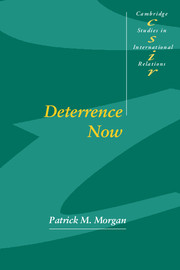Book contents
- Frontmatter
- Contents
- Acknowledgments
- List of abbreviations and acronyms
- Preface
- 1 History: deterrence in the Cold War
- 2 Deterrence and rationality
- 3 General deterrence
- 4 Testing, testing, one … two … three
- 5 Collective actor deterrence
- 6 The revolution in military affairs and deterrence
- 7 Deterrence in the post-Cold War world
- 8 Some conclusions
- References
- Index of names
- Index of subjects
- CAMBRIDGE STUDIES IN INTERNATIONAL RELATIONS
3 - General deterrence
Published online by Cambridge University Press: 22 September 2009
- Frontmatter
- Contents
- Acknowledgments
- List of abbreviations and acronyms
- Preface
- 1 History: deterrence in the Cold War
- 2 Deterrence and rationality
- 3 General deterrence
- 4 Testing, testing, one … two … three
- 5 Collective actor deterrence
- 6 The revolution in military affairs and deterrence
- 7 Deterrence in the post-Cold War world
- 8 Some conclusions
- References
- Index of names
- Index of subjects
- CAMBRIDGE STUDIES IN INTERNATIONAL RELATIONS
Summary
We have an additional theoretical topic that is relevant for the ensuing chapters. Having explored what can be learned from the Cold War and from analysis of deterrence as a rational activity, we turn to general deterrence. I define it as what is present where (a) relations between opponents are such that at least one would consider attacking if a suitable occasion arose, (b) the other maintains forces and offers warnings of a forceful response to deter attack, and (c) the first party never goes beyond preliminary consideration of attacking because of the threat from the second party. General deterrence is to ensure that thinking about an attack never goes very far, so crises don't erupt and militarized disputes don't appear and grow. It is also used to avoid being coerced by threats – you look too tough to be pushed around (Morgan 1983, pp. 42–44; Huth 1999).
General deterrence is complicated and ambiguous, hard to analyze. It covers matters rarely referred to as part of deterrence, yet its main elements play a central role in security policies of states and in security management for any international system. The concept is widely mentioned in the literature, sometimes outlined, but rarely given further consideration: “General deterrence is among the most important and least systematically studied phenomena of international politics” (Huth and Russett 1993, p. 61). I am partly to blame; I intended to say more about it years ago but never did.
- Type
- Chapter
- Information
- Deterrence Now , pp. 80 - 115Publisher: Cambridge University PressPrint publication year: 2003
- 1
- Cited by

